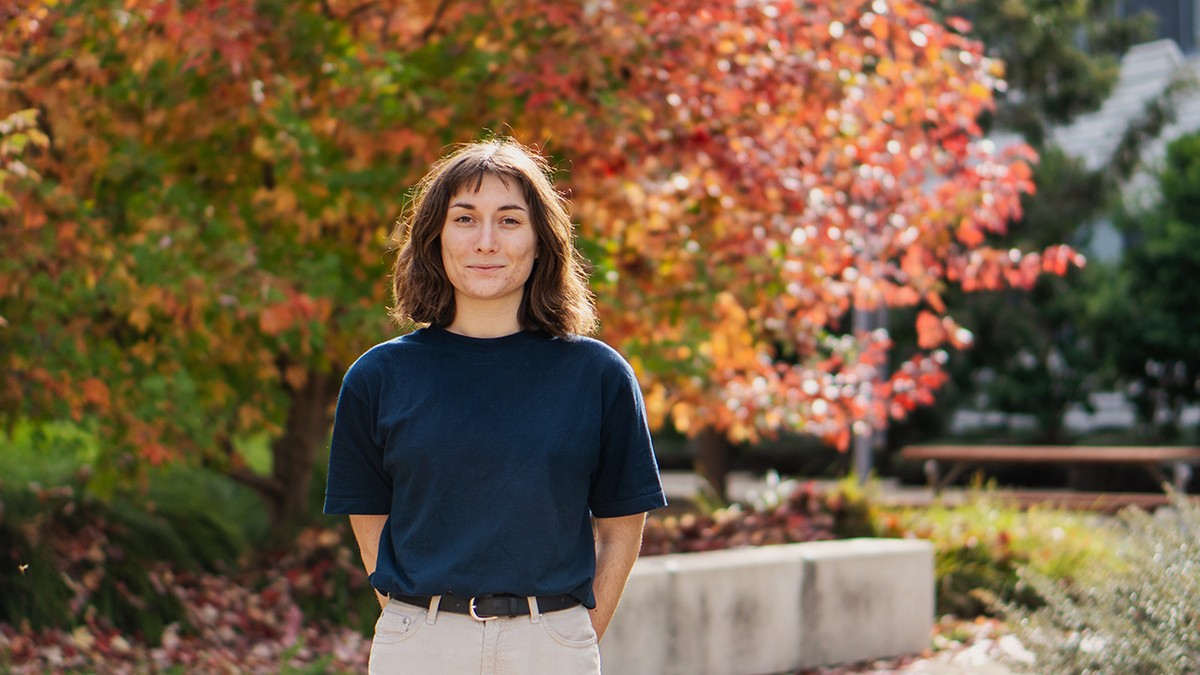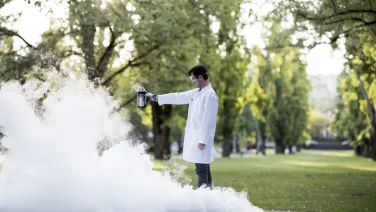Biochemist Sacha Pulsford is opening up nature’s toolbox to tackle Earth-sized problems
What do molecular biology and protein design have to do with improving sustainability and reducing our reliance on fossil fuels?
Plenty, according to PhD student Sacha Pulsford, who studies how proteins evolve and how they speed up chemical reactions. She’s only just started her PhD research and still has lots to explore, but she’s “really excited” to see where it leads.
Sacha’s interest was piqued during her Bachelor of Philosophy (Hons) degree at ANU, where she majored in plant science and genetics. She worked with “a lot of different labs” during her honours research, using genetic tools to engineer plants to be more resilient to environmental stresses or have more capacity for growth. Understanding how proteins work was central to all of those projects.
Now, for her PhD research, she’s “bringing some of the story that I worked on for Honours” to a new team in the Research School of Chemistry studying proteins in bacteria.
Bacteria have “big hollow balls of proteins” inside their cells, containing enzymes that help carry out specific functions.
“If we can work out how bacteria assemble these structures, and what all the components do, we could use that to speed up all sorts of different reactions for industrial purposes, fuelling a sort of bio-economy” Sacha says, helping to mitigate our reliance on and production of fossil fuels.
For example, one of those structures takes carbon dioxide from the atmosphere and converts it into sugars – “much better than plants are able to do, surprisingly”.
“By researching that in more detail, we may be able to engineer plants to enhance growth or carbon capture.”
This year, Sacha received a Westpac Future Leaders Scholarship, which provides funding, leadership development support and networking opportunities for a select few postgraduate students each year.
Sacha says this will give her “a lot more autonomy and freedom” throughout her PhD to foster collaborations and meet with other researchers both in Australia and overseas.
She’s also “excited” by the mentorship and leadership development aspects of the program.
“I grew up with two brothers and really looked up to my dad as a role model, and I never felt affected by my gender or being a woman in science,” Sacha says.
“But as you get further along in science, you see less and less female role models. It feels like it becomes a lot harder to aspire to a role that isn’t held by someone that looks like you, or had similar experiences to you.
“I hope to use my position as a tutor and teacher in different undergraduate courses to help other people who might feel that way, or who might find professors a bit intimidating at first!”
Sacha plans to keep working as a researcher, but also hopes to be a part of more “entrepreneurial ventures”.
“My ideal position would be using fundamental, curiosity-led research to inform industry,” she says.
“Everyone in the agricultural technology and molecular biology space is very excited about using all this knowledge to improve sustainable technologies – I think we can help generate a really thriving industry in Australia.”
Immerse yourself in research projects and carve out your own path to being a future leader and role model with a Bachelor of Philosophy (Hons) at ANU.


